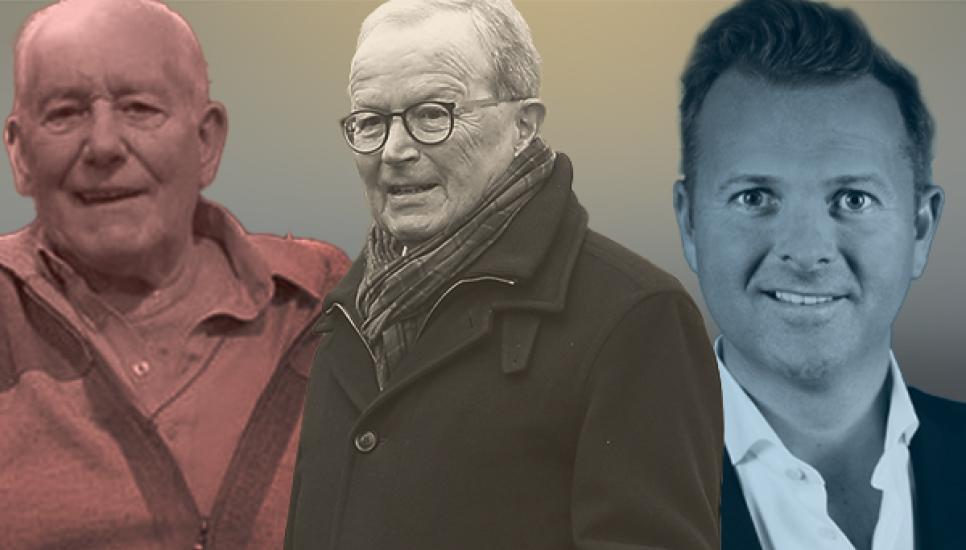FB Roundup: Jim Marshall, Kjeld Kirk Kristiansen, Matthew Riley

 Family-owned Marshall Amplification sold to Sweden’s Zound Industries
Family-owned Marshall Amplification sold to Sweden’s Zound Industries
The UK-based Marshall Amplification, which was founded by Jim Marshall (pictured left) and his son Terry in 1962 and has since gone on to become the amp of choice for some of the world's most famous musicians, has been acquired by the Swedish firm Zound Industries.
The agreement, which will see all Marshall brands and Zound Industries rebranded as the newly formed Marshall Group, will see the Marshall family retaining 24%, making them the largest shareholders.
“Combining our strengths and unique positioning as the Marshall Group will fuel our ambition to create premium, innovative, products and experiences for musicians and music lovers around the world,” said Jeremy de Maillard, chief executive of Zound Industries and the newly formed Marshall Group. “Zound has proven itself as a global, fast-growing and progressive company. With the Marshall Group, we are set to accelerate our profitable growth in a $100 billion market.”
The Milton-Keynes-based Marshall Amplification has been handpicked by the cream of the rock world over the years, with the likes of Jimi Hendrix, Eric Clapton, The Who, Oasis and many more among the brand’s famous fans. Marshall has had a relationship with Zound Industries since 2010 when they collaborated on a product list expansion into headphones, speakers, pedals and more.
“Since my father and I created the original Marshall amp back in 1962, we have always looked for ways to deliver the pioneering Marshall sound to music lovers of all backgrounds and music tastes across the world,” said Terry Marshall. “I'm confident that the Marshall Group will elevate this mission and spur the love for the Marshall brand.”
“Having worked alongside my father during his later years, I know he would be excited at this direction and the potential to reach a larger worldwide audience with innovation and passion which he always had in spades,” said Victoria Marshall.
 Share losses see profits fall for Lego family investment firm
Share losses see profits fall for Lego family investment firm
Kirkbi, the private holding and investment company set up by the family of Lego Group founder Ole Kirk Kristiansen, has reported a sharp drop in returns due to losses tied to assets.
Despite a rise in Kirkbi’s profits from the family’s 75% stake in Lego, which rose by 2% to $1.7 billion in 2022, the sustainability focused investment group posted a $394 million loss.
Kirkbi, which was founded to build a sustainable future for the family ownership of the Lego brand, is chaired by the 75-year-old Kjeld Kirk Kristiansen [pictured right], the grandson of the popular toy firm’s founder and one of Denmark’s richest people (with a fortune of $4.9 billion, according to the Bloomberg Billionaires Index).
Over the past few years, Kristiansen has been increasingly handing over control to his three children, Thomas, Agnete and Sofie, with whom he shares even split ownership of the family’s 75% Lego stake. Kjeld Kirk Kristiansen stepped down from Lego's board in 2019 and his son Thomas, currently Lego's deputy chairman, will replace him as chair of Kirkbi in 2023.
 Matthew Riley’s Daisy Group poised to buy cybersecurity firm ECSC
Matthew Riley’s Daisy Group poised to buy cybersecurity firm ECSC
Matthew Riley, the tech entrepreneur, founder of the privately held British IT services provider Daisy Group and one of Britain's wealthiest self-made people, is lining up the purchase of his first cybersecurity acquisition, the AIM-listed ECSC.
Currently providing services to a number of blue-chip clients, ECSC currently employs 60 cybersecurity specialists with a total workforce of 80 and is expected to become part of Daisy's Corporate Services division once the sale has been finalised.
“Whilst the strategy for ECSC is underway, there are some inevitable headwinds from increased competition, pricing pressures and wage inflation especially in the technology sector,” said ECSC chief executive officer Matthew Briggs. “Taking these factors into account, together with a strategy which can only be executed over a 12–24 month period due to the nature of 'big ticket' contract negotiations, the opportunity to be acquired by Daisy at a significant share price premium and a ready-made cross sell client base makes this acquisition very attractive for ECSC.”
The ECSC purchase is the latest in a series of deals Riley has made in recent months, including the purchase of rival XLN Telecom for £210 million in late 2022. Now second only to BT Group in the UK's SME telecoms market (according to Sky News), Daisy Group manages mobile, cloud and other services for business customers and employs 1,000 people.






